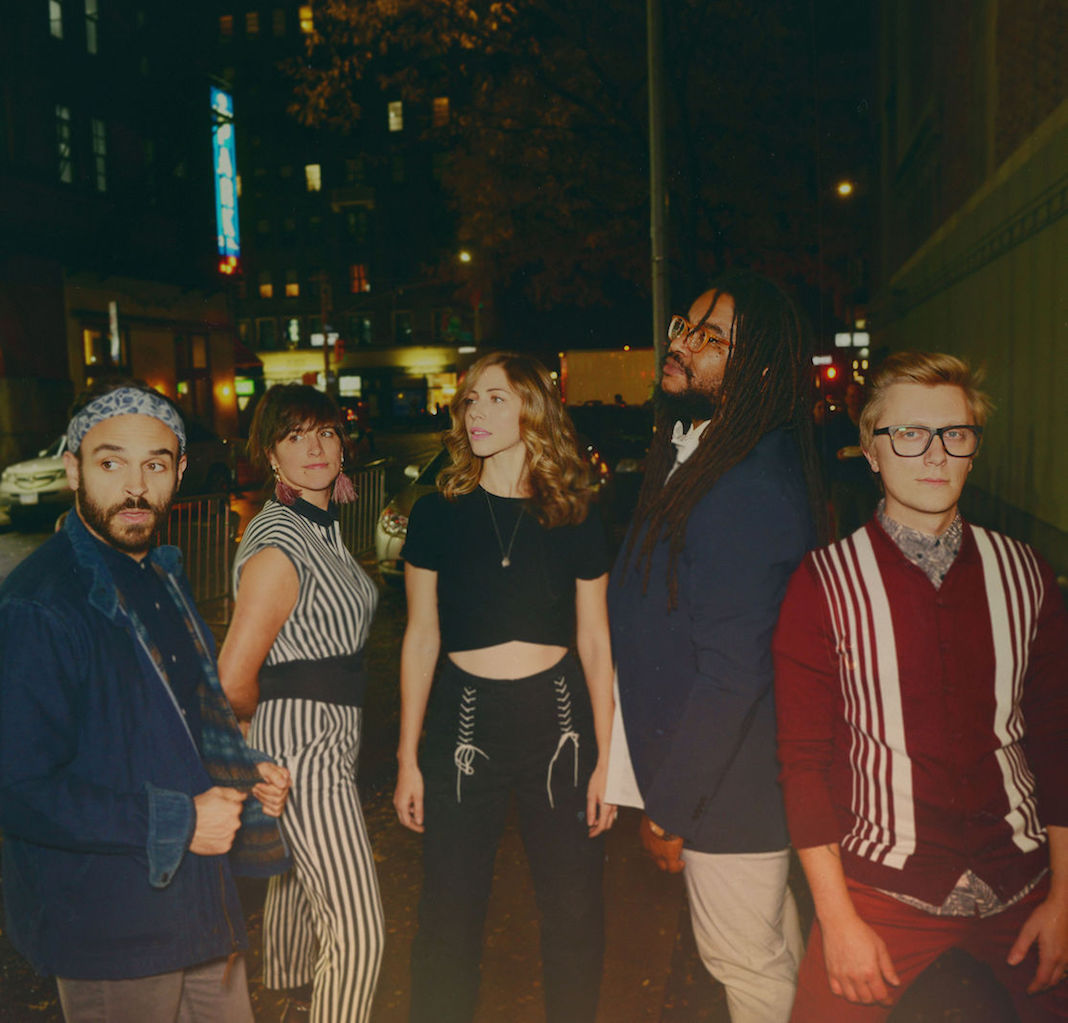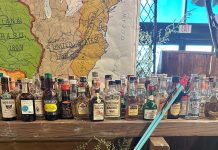
Photo by Shervin Lainez
In 2004, four kids meet at the New England Conservatory of Music in Boston and decide to start a band. Fifteen years and nine albums later, with a handful of world tours and television appearances under their belt and over a million monthly listeners on Spotify, Lake Street Dive has been more successful than they could have dreamed of back in those early college days. With their genre-defying soulful sound and clever lyrics, this group of friends and artists is sure to continue their rise.
Mike Olson, trumpeter and guitarist (among other things) for Lake Street Dive, is a St. Louis Park native. The band is based out of New York, but shows in his hometown have allowed Olson to show the rest of Lake Street Dive around the Twin Cities and their namesake street.
They’ll be back in town to perform two shows with Nicole Atkins at the Palace Theater in St. Paul, June 28 and 29. But before that, let’s get to know Lake Street Dive’s local connection.
What got you into music? How did you know it was what you wanted to do?
It was my parents that got me started in music; they were both performers and music educators. My dad still teaches at Blake High School, he teaches band and orchestra there. They put a trumpet in my hand very early on. My dad played the saxophone and my mom played the flute, and they wanted to round out the potential gig opportunities that a person can have. They always told me that saxophone players and flute players don’t get gigs on Easter, trumpet players do. They wanted one of the Olsons to have a gig on Easter. I don’t know how legitimate that reason truly is, but that was the story I was always told.
It was less of a conscious decision and more of a foregone conclusion for me, I would hazard to say that was also the case for the rest of the band. When you discover something that is so very much a part of the fabric of your family experience and the fabric of what makes you you, it’s hard to turn your back on that, it’s hard to think of anything else that you want to do. And then when you begin to have these experiences playing with other people who are so like-minded, it’s a no-brainer, I guess.
How did you and the other members of Lake Street Dive come to start making music together?
It started really casually, just practicing in practice rooms and student recitals and things like that. When we started gigging, it was really very inauspicious, playing restaurants, cafes, bars that wouldn’t pay us—and I can’t blame them. We just had the good fortune of it sort of growing and progressing at its own rate.
As the Minneapolitan of the band, I imagine you’re responsible for the name. Why did you choose it?
Wow, Minneapolitan—I’m not sure I even knew that’s what we were called. My uncle lived on Lake Street in the ‘70s, and he was a trumpet player, too. He would tell stories of this semi-mythical Lake Street of yore, I don’t know how indeed mythical it was. He claimed that he was able to walk to most of his gigs just up and down Lake Street, in and out of bars, playing with the various bands that he was a member of at the time. He described it as something that was a little bit seedy, I suppose, but also very charming, and kind of like the beating heart of the scene for him at that moment.
So when we started playing music together, one of the intentions behind the band was to step away from the sort of button-down atmosphere of jazz school that we existed in. For us, jazz is very much a museum piece, something that was performed in concert halls, and if you did play it at a club, it was at these very fancy jazz clubs where famous jazz musicians had played and the waiters all wear tuxes. We desired to do a return to something a little bit greater, sort of like the bar band aesthetic. So the image of that fantastic, gritty Lake Street of the past very appropriate, very evocative for us.
https://www.instagram.com/p/BRPTdAoD_WS/?igshid=1r35vw43adud6
Has Lake Street Dive lived up to its name and the aspirations behind it by playing at dive bars?
Oh yeah, I mean that’s where we lived for many, many years. Playing bars in various stages of dive, some worse than others, some a lot better than others. We still occasionally get to play rock and roll clubs that are perhaps a little bit past their prime in a very charming way. But the dive, the bar scene, it’s very much in our past now, for better or for worse.
How does it feel to come back to the Twin Cities and play not in dive bars, but in iconic venues like those operated by First Avenue & 7th St. Entry?
Playing First Ave, it’s the kind of gig where if we all somehow tragically died after the last note, we could pretty much say that we had had a very full musical life without any regrets. First Ave is—and I’m not trying to butter anyone’s rolls here—it’s in the top five most iconic and most wonderful places to play in the nation.
When we first started playing at the Palace [Theater] in St. Paul, it was so brand-spanking-new, still smelled like paint in the green rooms. We quickly found that the spirit of First Ave was very much carried over into that newer environment. All the same loaders were there, the same promoters, all the people that really make that venue special were very present. It’s like coming home. Not just for me as, again, a Minneapolitan, which I’m now going to use all the time. But I think that the homey feeling has permeated the rest of the band, and I think that they really enjoy going back to that environment as well.
What has been your greatest challenge as a band?
We have sort of an ongoing joke where we like to say that we have spent our entire career falling ass-backwards into success. In some ways that is true, we had a lot of really lucky breaks. YouTube was a surprise tool for us that was very lucrative. We had a few very lucky breaks, with some television appearances, with some live concerts that we were able to be a part of. I would say that we haven’t had a lot of adversity, which is sort of unfortunate, because adversity is helpful.
I think that one of the biggest challenges that we had was the decision early on to go full-bore with one project. We all went through phases where we were all so busy with not only this band but with a lot of other projects. We’re very musically omnivorous as individuals, it’s really tempting for people like us to want to be involved in as many things as possible, to have side projects, to front our own bands, to have side careers in other genres. A jazz career, play in a bluegrass band, front an indie rock band, that kind of thing. We had a couple of tumultuous years early on where we were trying to balance those things with Lake Street Dive.
It became increasingly apparent that this was the project that had legs, had the greatest potential. We had to have, like, a band come-to-Jesus, where we sat down and really had to devote ourselves. Not only to this band, it also meant that we had to devote ourselves to each other. It was a major sacrifice, but I also think that it was the right decision, it paid off in spades. I think that it would be really hard for us to imagine having a bunch of other projects going along with this one and still experiencing the same success that we’ve had.
And you have had a lot of success, Lake Street Dive has been touring for months now, you’ll continue to do so into next year. Do you still get nervous about performing?
Yes, absolutely. I mean, I do, I don’t think the rest of the band does. There’s a lot of diversity in personalities within this band, and I think that helps, it’s critical to have a diversity of personalities. There are some of us that are comfortable only on stage, there are some of us that are least comfortable on stage, there are some of us that get that adrenaline rush from performing that’s very different from that adrenaline rush of performance anxiety. I get performance anxiety, but I don’t think the rest of the band does, and I’m glad for it. They help me get up and over that hump, and have a good time every night.
Who are some musicians who have influenced you and Lake Street Dive?
Personally, very early on, I was always very drawn to Miles Davis. Not only as a unique and innovative trumpet player, but also as a band leader. Miles Davis is someone who was perhaps a better band leader than he was anything else. He was someone that could find the perfect musicians, and write or choose the perfect music for them, inspire them to elevate the ensemble beyond where they all existed as individuals.
As a kid in college, I wanted to be that kind of band leader, so when I did put together a band—I played in a handful over the years—picking personalities was very, very, very important to me, and something that I wanted to style after Miles Davis. Obviously, those are big shoes to fill, and I can’t actually do that very many times. But Lake Street Dive is very successful in that sense.
Then as the band progressed, and as we sort of began to hone in on our musical style as a band, we have used the Beatles as a regular touchstone for arranging, for song writing, for part writing on our individual instruments. And I think that is very true, not only as a band, but also as individuals. I consider George Harrison to be one of the most melodic guitar players of all time, someone whose part writing was always so excellent. Bridget [Kearney] I know admires Paul McCartney’s bass playing very much. Mike [Calabrese] is a fierce Ringo [Starr] devotee, and won’t hear anyone say anything otherwise.
We also look at a lot of the soul icons, the Sam Cookes, the Aretha Franklins. There are a lot of really incredible live recordings by those artists that have been very informative and instrumental in our development as a band and, again, as individual musicians as we hear the way a great band can support a great singer.
We all have our own heroes, but it’s also really gratifying to have spent enough time with the same band that you can kind of relate as a unit to other units of the past as well.
What has been your proudest accomplishment as a band?
I would point to the release of Free Yourself Up as a very, very proud moment because we self-produced that record, which we had never done before. Like, for Side Pony, we hired a relatively big-name producer to work with on that; with Bad Self Portraits, we worked with a producer-engineer. We always worked really closely in the studio with the producer and the engineers and the people that we had surrounded ourselves with, but we had never really gone the extra mile and put the onus squarely on our shoulders, really put ourselves in the role of producer.
And when you do that, you can’t step out when you’re burned out and, you know, read a book while someone else is doing a take. Everyone was on deck all the time, listening back to the band takes and making decisions about everything from the exact phrasing that Rachael [Price] would use on a line or the exact place to punch in a second take for the drums or what have you. It was a very intimate experience for all of us. There was a lot of our own pride on the line because we were calling ourselves producers but it had to be an egoless experience, because you had to be able to surrender yourself to the rest of the band instead of a hired-gun fifth or sixth party, since Akie [Bermiss] was there too and very heavily involved.
So when we did come out the back end of that with a product that we were really proud of, and when it did become released, and it was as well received as it was, we were able to congratulate ourselves and pat ourselves on the back in a very different way than with the release of any of our previous records in the past. This one was really our baby, more so than anything else. And when you actually have a baby, and it starts to walk, that’s a pride that’s unspeakably wonderful.
Lake Street Dive has two upcoming shows with Nicole Atkins at the Palace Theater in St. Paul, June 28 and 29.








